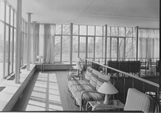Click on course title to link to individual course webpages or syllabi.
UNDERGRADUATE COURSES
HSTAA 208 - The City: People, Places, Environments
This lecture course surveys the history of cities in North America and around the globe from 1800 to the present day. We consider the public and private forces shaping urban development over time; the lived experience of different individuals and groups, and their interactions in public and private spaces; how the city has figured in the popular imagination as well as how it has been imagined and re-imagined by political leaders, artists, and planners; and the environmental impacts of urbanity and the role of nature in the city.
HSTAA 303 - Modern American Civilization From 1877
This lecture course surveys the United States from the Reconstruction Era to the present, focusing on the relationship between state and society, economic and technological change, and struggles for civil and economic rights. The course covers pivotal events, transformative public figures, and social and cultural forces shaping the modern U.S., its relationship with its own citizens, and its changing role in the world.
HIST 388 - Left, Right, and Center: Partisan Politics in Twentieth Century America
This seminar explores the evolution of the national Democratic, Republican, and independent political parties over the course of the twentieth century. We address how shifting demographics, market changes, and social issues changed the composition of the major national parties over time, and examine key political leaders who shaped the identity and future of their political party – from Teddy Roosevelt to Franklin Roosevelt, Strom Thurmond to Barry Goldwater, Richard Nixon to Ronald Reagan, to two Bushes and two Clintons. Readings and discussion cover the major social movements that shifted party allegiances, watershed elections, cultural and social issues shaping party platforms, and the growing influence of the independent voter. Our work in this seminar will consider differing approaches to and definitions of 'political history' over time, and how this subfield relates to the broader sweep of American historical scholarship.
HIST 498C - Suburbia
This capstone seminar explores suburban development in the United States and elsewhere around the world from the nineteenth century to present. We explore many different varieties of suburbs, considering suburbia as a place that both generated and reflected crucial political, social, and economic transformations. Readings and research papers will also provide a closer examination of Seattle’s suburban landscape and the drivers of regional suburban growth over time.
GRADUATE COURSES
HSTAA 522 - American History: Writings and Interpretations Since 1870
This graduate seminar introduces major works in the historiography of the modern United States, including political history, social history, cultural history, urban history, history of technology, business history. This is the third in the U.S. history core sequence for graduate students. When room is available, students from programs other than History are welcome. This course is for graduate students only.
HSTAA 590/PB AF 599 - Welfare States
This graduate readings course focuses on the emergence of the broadly defined American welfare state, including health care, social insurance, employment, and anti-poverty programs , from the Progressive Era to the present. Our readings and discussions will trace this history from the reform movements of late-19th-century cities, through the establishment of early state-level programs for women and children, to the New Deal, the Great Society, and “the end of welfare as we know it.” We will consider how and why social welfare provision in the US is different from international counterparts, and more broadly consider the historiography of welfare states here and abroad.
HSTAA 590 - American Urban History
This graduate readings course explores the historiography of urban America and changing interpretations of the American city and its inhabitants. We read major works in the field of U.S. history, exploring in particular the history of urban governance and reform, city planning, urban space and neighborhood segregation, urban “crisis” and recovery, and the tension between the urban and the non-urban in American culture and politics. The course also considers American cities in an international context, identifying major international trends and influences upon American urban policy and planning, and comparing and contrasting the drivers of urbanization in other nations and continents.
Course archives |
